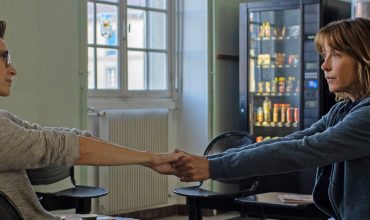It’s easy to be a bit snobby about a film like TO OLIVIA. It’s so very earnest. Made for British tv, but released in cinemas in Australia, it tells the story of author Roald Dahl and his Hollywood star wife, Patricia Neal.
Considering Dahl’s famous writing, you might expect a childish, macabre, and wickedly funny take on the lead up to his success with ‘Charlie and the Chocolate Factory’. Alternatively, if you know a bit more about Roald Dahl as a person, perhaps a depressing, unflinching look at a man who was often quite cruel to the people who loved him.
Instead, the film does neither. But that’s okay. There are times for wacky adventures, and times for incisive biography. And there are times for narratives that are about family life, loss, and perhaps some charitability to the people involved.
TO OLIVIA is about the sudden death of Neal and Dahl’s eldest daughter, Olivia. She died at the age of seven from measles encephalitis. There was no vaccine available in Britain at the time. In the film, she and her father have an incredibly special bond. She’s his golden child. In fact, between his writing and the long walks to the sweets shop with Olivia, Roald Dahl doesn’t have much time for anything else.
Meanwhile, Patricia Neal (played by Keeley Hawes) is valiantly trying to maintain a Hollywood career from the end of a phone in rural Buckinghamshire.
When Olivia dies so suddenly, Roald Dahl is destroyed. In his own words, he was left ‘limp with despair’. He is consumed by his own misery, ignoring his wife’s grief. And striking out at little Tessa, the second daughter.
Poor Tessa, even before her sister’s death, was well aware she was not her father’s favourite. And with Olivia gone, Roald Dahl proves it over and over. It’s hard to watch. Hard to forgive.
But the misery in these scenes gives young Isabella Jonsson a chance to shine. While she plays the role of Matilda in the London run of MATILDA: THE MUSICAL, this is her first film performance. There’s a moment where she sits alone on the stairs, hugging together as many of her soft toys as her little arms allow. ‘Everybody hold hands,’ she says. My heart broke.
In fact, the film is filled with amazing performances. The script is just ‘not bad’, but the actors make it quite delightful. Keeley Hawes is both glamorous and courageous as a frustrated and grieving Patricia Neal. And Hugh Bonneville makes the drunken outbursts of a miserable Roald Dahl more sympathetic than the author probably deserves.
TO OLIVIA is also the final performance of British actor Geoffrey Palmer (‘As Time Goes By’, ‘Tomorrow Never Dies’). He is darkly funny as the Archbishop of Canterbury, the man who infamously convinced Roald Dahl that religion was a sham. The scene of that moment is as incredible as you’d expect from actors with the skills of Palmer, Bonneville, and Hawes.
TO OLIVIA is sweet, sad, and incredibly British. If you’re looking for a hard hitting biography about either Roald Dahl or Patricia Neal, this probably isn’t it. But if you’re looking for a story about imperfect parents managing great loss, and a little girl desperate to matter to either of them, set in beautiful rural England, FOR OLIVIA is right on the money.
Rating: 6/10


